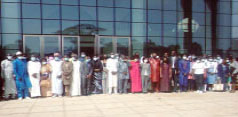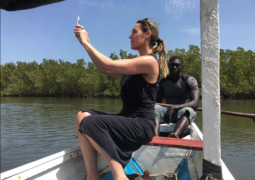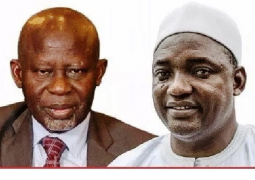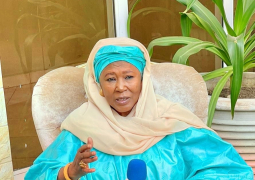
Emmanuel Daniel Joof, chair of the NHRC, in an address to the audience said: “The moot competition is named after the late President Sir Dawda Kairaba Jawara in recognition of his efforts in laying the foundation of the regional human rights mechanism of the African continent.”
“During the maiden moot and during the opening of the second edition, we elaborated on the role Sir Dawda played in giving us what we know today as African Commission on Human and People’s Right (ACHPR).”
“He played a pivotal part in the whole process at a time when human rights was something most heads of state were not attuned to. In fact, in those days, when you mention human rights, it was only apartheid in South Africa that was condemned.”
“Sir Dawda during that period when human rights were not popular, took up the mantle to champion the course of human rights. So, I think it is fitting that this moot competition that the National Human Rights Commission (NHRC) in collaboration with the University of the Gambia (UTG) Faculty of Law have come up with is named after him.”
The Moot Court Competition aligns with the general mandate of the NHRC to promote and protect human rights and especially under Section 12, Subsection E of our Act.
The theme of the 2021 Moot Competition is centered on ‘State Responsibility in Respect of Human Rights of Migrants in Africa’.
“According to the International Office of Migration, migration plays a significant role in Gambian society, with overseas remittances of Gambians living abroad amounting to over 20% of the country’s GDP. It has also noted that socio-economic challenges in the Gambia have driven the youths to undertake the irregular migration through the dangerous Mediterranean Sea. While Gambians that have crossed to Europe continue to be deported back to home, there is a significant lack of clarity on the nature of obligation of the deporting state and The Gambia,” the NHRC boss disclosed
OHCHR and UNODC representative, Ms. Devon Masarakufo also said: “Migrants can be very vulnerable to human rights violations and tend to be disproportionately vulnerable to discrimination, exploitation and marginalisation.”
“International human rights law requires states to protect, respect and to fulfill human rights at all times including all migrants on their territory regardless of status. The Gambia has ratified the international convention of the protection of the rights of all migrants and members of their families, which applies during the internal migration process including return migration.”
“So, it gives us great pleasure and I am sure that my colleague, Fumiko, is also pleased to see the National Human Rights Commission (NHRC) and the University of the Gambia (UTG) organise such an event to highlight the importance of advocating for the rights of migrants.
The UTG Law Faculty Acting Dean, Malick said: “We reached out to the NHRC as a partner and together we have been able to develop an international moot court competition, which I am pleased to say has gone from strength to strength over the years.”
“The International Moot Court Competition has been in existence for a few years now and as a faculty, we actually find it very fulfilling as an institution. In the sense that it has provided our students with much needed exposure to the legal framework governing the respect, protection and promotion of human rights.”
He concluded that under his leadership, the Law Faculty of UTG would ever be committed, ready and willing to be part of the great initiative.
Read Other Articles In Headlines




